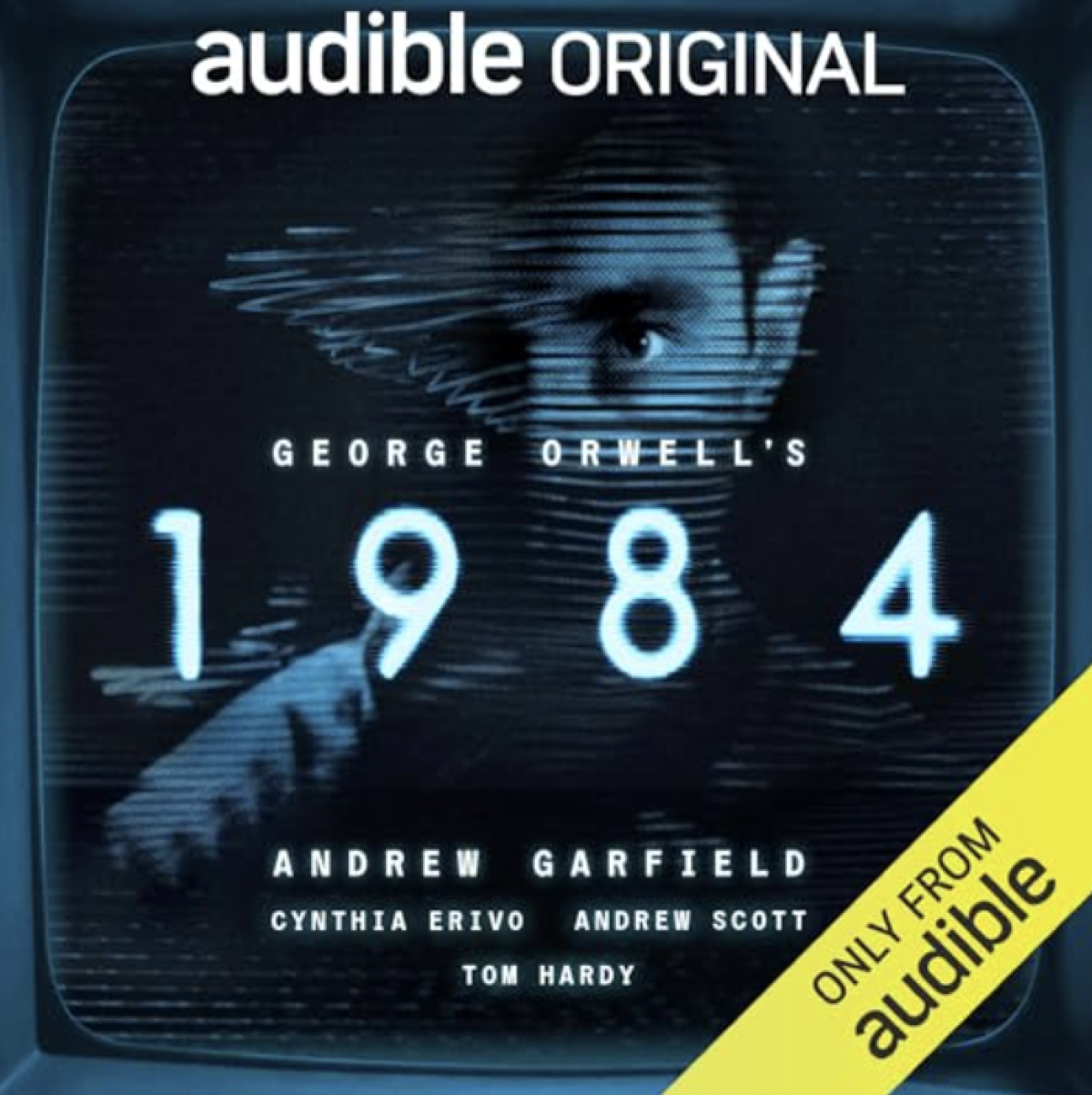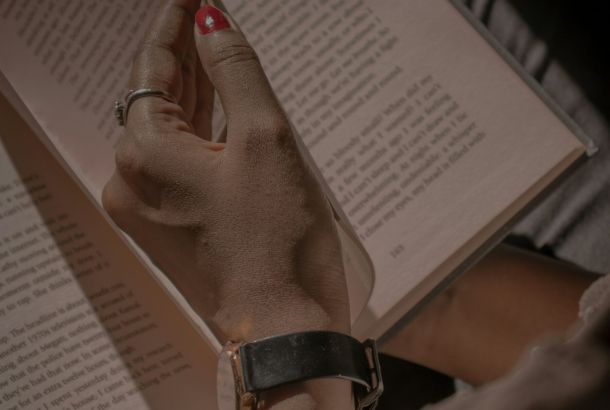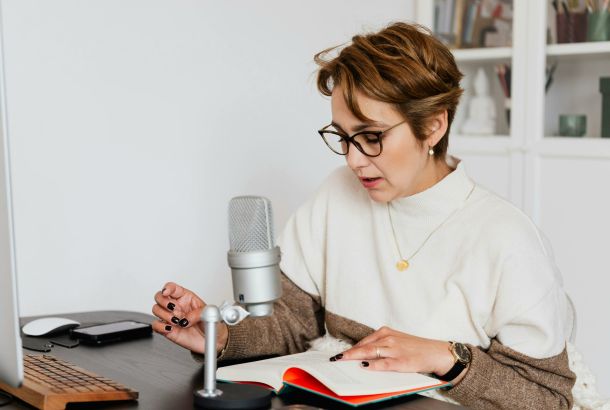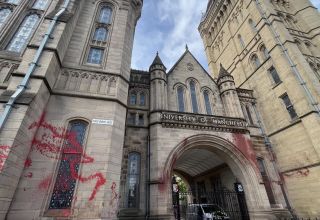Audible plunges listeners into the depths of George Orwell’s 1984, leaving me dazed and hooked
By Erin Botten

I picked up 1984 from the library once. Three weeks later, I slipped it back into its designated space, unread. Unread maybe is a strong word… as I had made a futile attempt at the first page. Yet, the small stamped font paired with an introduction I neither understood nor cared for set off a series of events that led it to its resting place, back on that library shelf.
Jump a few years into the future, and a debate is going around in circles. “Audio books don’t count as reading a book, the app is called Goodreads.” An elitist if not definitely an ableist argument from someone who read about spheres and the number 0. I didn’t care. If I consumed the content of the book, regardless of it my eyes skimmed letters or if those words were read aloud through headphones, I’ve consumed the book. I know how it starts, and I know how it ends. And, that is the same for 1984, newly dramatised by Aubile – and free to listen to.*
Most audiobooks are simply reading of the books, straight from the pages. The most acting you’ll witness is perhaps a butchered accent in a Danielle Steele novel, or the pinched impression of a mother in Richard Wright’s Black Boy (read by Peter Francis James). Yet, it is these impressions, voices, and tones that bring a story to life; that make you drift off and quickly lose yourself for hours, not wanting to to switch the book off. From the get-go, Audible’s 1984 is similar yet different, and not quite like anything I’d ever heard.
I grew up on this track as a child – the opening to the radio drama, The Archers. The atmosphere was set from that first jumping note, giving you seconds to switch off and hone in on the plot that lay ahead. The score is crucial to setting the scene at times, and 1984 made firm use of theirs. It can only be described as BBC Sci-Fi, with elements of Doctor Who or The Sarah Jane Adventures, telling you that an adventure lies ahead. The only difference? This is George Orwell, not the BBC. The ‘adventure’ is looming PTSD, never blinking eyes, and tip-toeing the line closer to death. The score never truly let you forget that you are listening to 1984, and if anything, this was just a precious second to catch your breath.
Unlike the Danielle Steele novels, the acting was phenomenal, with Destiny Ekaragha (director) and Joe White (playwright) clearly being a match made in heaven.
Andrew Garfield takes centre stage as Winston Smith to the point I forget who I’m listening to. His fears, sweat, and persistent paranoia as Winston drags you in, like a parent watching a child, trying to grasp some sense of understanding from the facts laid before you.
See, I roughly (but not really) knew the plot of 1984. I know it’s about constant government surveillance, with a cult-like following to the party. I imagined it to be like the USSR, North Korea, or modern-day China, with hoards of faceless people cheering and booing on demand, and it was. Whatever the telescreens (of which there is one in every single room) dictated, both in/directly, the ‘party members’ would seemly eagerly follow. Yet, at the root of George Orwell’s 1984 is paranoia, desperation, and isolation. “Am I the only ‘thought criminal’ in this room, or are there more?”
Through the seven parts of Audible’s adaption, the genre almost changed from dystopian fiction, to romance, to political sci-fi. While Winston’s focus may have shifted, the echoes of the party lingered in every conversation and every scene. Just like Nazi Germany, of which 1984 was clearly inspired by, every aspect of one’s life is infected by the political system in which they live, regardless of if they’re conscious of it or not.
I spotted the links to Germany from the introduction to Winston’s neighbours, specifically the Parson’s daughter. The Parson’s daughter’s life was absorbed by spotting thought criminals, attending hangings, and ultimately ‘terrorising’ her mother. Even her father (Mr Parsons played by Romesh Ranganathan), who kept a cool head for the majority of the time seemed unnerved by his daughter’s relentless and unforgiving passion for the party. Even Winston, a reclusive neighbour, notes that it would only be a matter of time before the Parson’s children sold their parents out for Big Brother (Tom Hardy). Like Nazi Germany’s Hitler Youth, children were the pawns of Big Brother, while the adults remained scared liabilities.
What surprised me was Julia, aka “the black-haired girl”, played by Cynthia Erivo. When we’re not focused on our hatred for Big Brother, we’re focused on Julia, and our love and hate for her. She is almost the embodiment of Big Brother in her emotional lure over Winston, transforming his perception from pure hatred to supposedly unwavering love within a few days. To a shell of a man. It is with her that you become lost, like Winston, from the outside world. The performance between Erivo and Garfield is at the heart of George Orwell’s 1984 success. Not only in their talent and acting but in their ability to make you feel lost, confused, and irritated just as they do.
George Orwell’s 1984 was and is my only encounter with George Orwell’s work. By my GCSE years, Animal Farm was removed from the curriculum. The closest I had to the power struggle between state and society were The Handmaid’s Tale, The Hunger Games, and Maze Runner series. Yet the difference here was, apart from being teen-friendly (ish) dystopian fiction, resistance was possible as the plots rested on a relatively new power struggle.
In 1984 Britain, the cracks never gape into holes. Big Brother is calculated, ruthless, coordinated, and manipulative, dictating the mind and reality. Everything is a “doublethink,” and thus everything is confusing. There is no real truth as to what is happening. I think. Like I said, it is all very confusing, but worth every second.
So, is George Orwell’s 1984 worth listening to? Yes. Why? Because the age of uniformity is very confusing and will need another listen.
*Audible subscriptions are £7.99 per month, with 30 days free. To listen to George Orwell’s 1984 for free, along with other books included in your Audible membership, utilise those 30 days.







